|
1544 In Literature
This article contains information about the literary events and publications of 1544. Events *Summer – The engraver and publisher Cornelis Bos relocates from Antwerp to Paris, after becoming involved with an antisacerdotalist, free-thinking spiritualist sect. In his absence, he is declared to be exiled by the Council of Brabant. *December 31 – Eleven-year-old Princess Elizabeth of England presents her stepmother, Catherine Parr, with a manuscript book entitled '' The Miroir or Glasse of the Synneful Soul''. *''unknown dates'' **The University of Paris prohibits the printing of any book not approved by the appropriate University officials. **The first (partial) Latin translation of Achilles Tatius' ''Leucippe and Clitophon'', made by Annibal della Croce (Crucejus), is published in Lyon. New books Prose *Cardinal John Fisher – ''Psalmi seu precationes'' (posthumous) in an anonymous English translation by its sponsor, Catherine Parr, queen of King Henry VIII of England * Joh ... [...More Info...] [...Related Items...] OR: [Wikipedia] [Google] [Baidu] |
Cornelis Bos
Cornelis Bos or Bossche (c. 1506/10 – before 7 May 1555) was a Flemish engraver, printseller and book publisher, known for his accurate engravings of Italian works. His work is often signed with the monogram C-B. Biography He was born at 's Hertogenbosch, whence his surname ''Bos'' is derived, and is registered there until 1637, but he was in Antwerp by 1 April 1541 when he was granted citizenship of that city and membership in the Guild of St. Luke. There has been some speculation that he took a trip to Italy in the intervening years, but this is not certain. His earliest identified engravings reproduce Maarten van Heemskerck's ''Prudence and Justice'' (1537), and a work by Agostino Veneziano. His re-engraving of work by Marcantonio Raimondi does not necessarily indicate that he ever made a trip to Rome. Until 1544 Bos worked in Antwerp as an engraver, commissioned by publishers in the city's extensive book trade for illustrations in books. His engravings, copied from the pu ... [...More Info...] [...Related Items...] OR: [Wikipedia] [Google] [Baidu] |
Guillaume Postel
Guillaume Postel (25 March 1510 – 6 September 1581) was a French people, French linguist, astronomer, Christian Kabbalah, Christian Kabbalist, diplomat, polyglot, professor, Religious universalism, religious universalist, and writer. Born in the village of Barenton in Normandy, Postel made his way to Paris to further his education. While studying at the Collège Sainte-Barbe, he became acquainted with Ignatius of Loyola and many of the men who would become the founders of the Society of Jesus, retaining a lifelong affiliation with them. He entered Rome in the novitiate of the Jesuits in March 1544, but left on December 9, 1545 before making religious vows. Diplomacy and scholarship Postel was adept at Arabic language, Arabic, Hebrew language, Hebrew, and Syriac language, Syriac and other Semitic languages, as well as the Classical languages of Ancient Greek and Latin, and soon came to the attention of the Kingdom of France (1498-1791), French court. Travel to the Ottoman Empi ... [...More Info...] [...Related Items...] OR: [Wikipedia] [Google] [Baidu] |
May 24
Events Pre-1600 * 919 – The nobles of Franconia and Saxony elect Henry the Fowler at the Imperial Diet in Fritzlar as king of the East Frankish Kingdom. * 1218 – The Fifth Crusade leaves Acre for Egypt. * 1276 – Magnus Ladulås is crowned King of Sweden in Uppsala Cathedral. * 1487 – The ten-year-old Lambert Simnel is crowned in Christ Church Cathedral, Dublin, Ireland, with the name of Edward VI in a bid to threaten King Henry VII's reign. * 1567 – Erik XIV of Sweden and his guards murder five incarcerated Swedish nobles. *1595 – ''Nomenclator'' of Leiden University Library appears, the first printed catalog of an institutional library. 1601–1900 * 1607 – One hundred-five English settlers under the leadership of Captain Christopher Newport established the colony called Jamestown at the mouth of the James River on the Virginia coast, the first permanent English colony in America. * 1621 – The Protestant Union is formally ... [...More Info...] [...Related Items...] OR: [Wikipedia] [Google] [Baidu] |
Clément Marot
Clément Marot (23 November 1496 – 12 September 1544) was a French Renaissance poet. Biography Youth Marot was born at Cahors, the capital of the province of Quercy, some time during the winter of 1496–1497. His father, Jean Marot (c. 1463-1523), whose more correct name appears to have been des Mares, Marais or Marets, was a Norman from the Caen region and was also a poet. Jean held the post of ''escripvain'' (a cross between poet laureate and historiographer) to Anne of Brittany, Queen of France. Clément was the child of his second wife. The boy was "brought into France" — it is his own expression, and is not unnoteworthy as showing the strict sense in which that term was still used at the beginning of the 16th century — in 1506. He appears to have been educated at the University of Paris, and to have then begun studying law. Jean Marot instructed his son in the fashionable forms of verse-making, which called for some formal training. It was the time of the ... [...More Info...] [...Related Items...] OR: [Wikipedia] [Google] [Baidu] |
1544 In Poetry
Nationality words link to articles with information on the nation's poetry or literature (for instance, Irish or France). Events Works published * Vittoria Colonna, ''Canzoniere'' ("Songbook"), lyric poems—mostly sonnets, but also ''canzoni'' and ''capitoli'' in terza rima, keeping to classical Petrarchan style; the first section refers to her late husband, the second to religion and morals;Bondanella, Peter, and Julia Conaway Bondanella, co-editors, "Colonna, Vittoria" article, p 124, ''Dictionary of Italian Literature'', Westport, Connecticut: Greenwood Press, 1979 a fourth edition of her amatory and elegiac poems, including a larger proportion of pious works, published in Venice; Italy * Bonaventure des Périers, ''Recueil des Œuvres de feu Bonaventure des Périers'', including his poems, published following his suicide, in Lyon, France * Clément Marot, ''Œuvres'', edition in definitive arrangement, in Lyon, France * Maurice Scève, ''Délie, objet de plus haute vert ... [...More Info...] [...Related Items...] OR: [Wikipedia] [Google] [Baidu] |
Neurosurgery (journal)
''Neurosurgery'' is a monthly peer reviewed medical journal of neurosurgery and the official journal of the Congress of Neurological Surgeons. It is published by Oxford University Press. The journal publishes original research, reviews, and editorials. History Discussion about a new specialist journal began in 1973 at a Southern Neurosurgical Society meeting, held in New Orleans, Louisiana. For the next 3 years negotiations took place to either purchase an existing journal or start a new one. In July 1976, during a meeting of the Executive Committee of the Congress of Neurological Surgeons, the decision to begin a new publication was made at the recommendation of the Congress' Publication Committee. President Robert G. Ojemann made the announcement of its launch at the 26th Annual Meeting of the Congress of Neurological Surgeons on October 27, 1976 and the inaugural issue of ''Neurosurgery'' was published in July 1977 as a bimonthly publication. The journal shifted to monthly p ... [...More Info...] [...Related Items...] OR: [Wikipedia] [Google] [Baidu] |
Vidus Vidius
Guido Guidi (Latinized name Vidus Vidius) (10 February 1509 – 26 May 1569), was an Italian surgeon, anatomist and translator. Biography His father was a physician and his mother was the daughter of the painter Domenico Ghirlandajo. After practicing at Florence and Rome, he was invited by Francis I of France, Francis I of France to come to Paris to be his personal doctor and teach at the Collège de France. While in Paris, Guido Guidi befriended artist Benvenuto Cellini and published a book on surgery, ''Chirurgia'', in 1544. This book was one of the best illustrated at the time and was based on works of Hippocrates, Galen, and Oribasius. In 1547, Guidi returned to Italy to become the personal physician of Cosimo I de' Medici, Cosimo di Medici and taught at Pisa. He took holy orders and was ennobled. A book on medicine, incomplete at his death in 1569, was finished by his nephew as ''Ars Medicinalis'' between 1596 and 1611. Today, the Vidian nerve in the skull and the ... [...More Info...] [...Related Items...] OR: [Wikipedia] [Google] [Baidu] |
Aristotle
Aristotle (; grc-gre, Ἀριστοτέλης ''Aristotélēs'', ; 384–322 BC) was a Greek philosopher and polymath during the Classical period in Ancient Greece. Taught by Plato, he was the founder of the Peripatetic school of philosophy within the Lyceum and the wider Aristotelian tradition. His writings cover many subjects including physics, biology, zoology, metaphysics, logic, ethics, aesthetics, poetry, theatre, music, rhetoric, psychology, linguistics, economics, politics, meteorology, geology, and government. Aristotle provided a complex synthesis of the various philosophies existing prior to him. It was above all from his teachings that the West inherited its intellectual lexicon, as well as problems and methods of inquiry. As a result, his philosophy has exerted a unique influence on almost every form of knowledge in the West and it continues to be a subject of contemporary philosophical discussion. Little is known about his life. Aristotle was born in th ... [...More Info...] [...Related Items...] OR: [Wikipedia] [Google] [Baidu] |
Pliny The Elder
Gaius Plinius Secundus (AD 23/2479), called Pliny the Elder (), was a Roman author, naturalist and natural philosopher, and naval and army commander of the early Roman Empire, and a friend of the emperor Vespasian. He wrote the encyclopedic ''Naturalis Historia'' (''Natural History''), which became an editorial model for encyclopedias. He spent most of his spare time studying, writing, and investigating natural and geographic phenomena in the field. His nephew, Pliny the Younger, wrote of him in a letter to the historian Tacitus: Among Pliny's greatest works was the twenty-volume work ''Bella Germaniae'' ("The History of the German Wars"), which is no longer extant. ''Bella Germaniae'', which began where Aufidius Bassus' ''Libri Belli Germanici'' ("The War with the Germans") left off, was used as a source by other prominent Roman historians, including Plutarch, Tacitus and Suetonius. Tacitus—who many scholars agree had never travelled in Germania—used ''Bella Germani ... [...More Info...] [...Related Items...] OR: [Wikipedia] [Google] [Baidu] |
William Turner (naturalist)
William Turner (1509/10 – 13 July 1568) was an English divine and reformer, a physician and a natural historian. He has been called "The father of English botany."Samson, Alexander. ''Locus Amoenus: Gardens and Horticulture in the Renaissance'', 2012 :4 He studied medicine in Italy, and was a friend of the great Swiss naturalist, Conrad Gessner. He was an early herbalist and ornithologist, and it is in these fields that the most interest lies today. He is known as being one of the first "parson-naturalists" in England. He first published '' Libellus de Re herbaria'' in Latin in 1538, and later translated it into English because he believed herbalists were not sharing their knowledge. Turner's works were condemned under Henry VIII and under Mary Tudor. Biography Early years Turner was born in Morpeth, Northumberland, in or around 1508. His father was probably a tanner of the same name. He studied at Pembroke Hall, Cambridge University, from 1526 to 1533, where he recei ... [...More Info...] [...Related Items...] OR: [Wikipedia] [Google] [Baidu] |
Juan Pablos
Giovanni Paoli, better known as Juan Pablos (1500?–1560 or 1561), a native of Lombardy, was the first documented printer in the Americas when he started printing in Mexico in 1539. Biography Giovanni Paoli was born in the region of Brescia around 1500. He may have been trained in the same school as Aldus Manutius, but apart from that, nothing is known about his early years. In 1536, Juan Cromberger wanted to establish a printing house in Mexico and sent Juan Pablos to Mexico City. Pablos departed from Seville on 12 June 1539 and arrived in October 1539, when he set up the company in the " casa de Juan Cromberger". Cromberger's name also appeared on all early publications in Mexico until 1545 even though he never visited Mexico and died in 1540. The first known book to be published in the Americas was the 1539 edition of the ''Breve y mas compendiosa doctrina Christiana en lengua Mexicana y Castellana'' by Juan de Zumárraga. Juan Pablos obtained the necessary patents and p ... [...More Info...] [...Related Items...] OR: [Wikipedia] [Google] [Baidu] |
Michael Stifel
Michael Stifel or Styfel (1487 – April 19, 1567) was a German monk, Protestant reformer and mathematician. He was an Augustinian who became an early supporter of Martin Luther. He was later appointed professor of mathematics at Jena University. Life Stifel was born in Esslingen am Neckar in southern Germany. He joined the Order of Saint Augustine and was ordained a priest in 1511. Tensions in the abbey grew after he published the poem ''Von der Christförmigen, rechtgegründeten leer Doctoris Martini Luthers'' (1522, i.e. On the Christian, righteous doctrine of Doctor Martin Luther) and came into conflict with Thomas Murner. Stifel then left for Frankfurt, and soon went to Mansfeld, where he began his mathematical studies. In 1524, upon a recommendation by Luther, Stifel was called by the Jörger family to serve at their residence, Tollet Castle in Tollet (close to Grieskirchen, Upper Austria). Due to the tense situation in the Archduchy of Austria in the wake of the execu ... [...More Info...] [...Related Items...] OR: [Wikipedia] [Google] [Baidu] |


_2.jpg)



